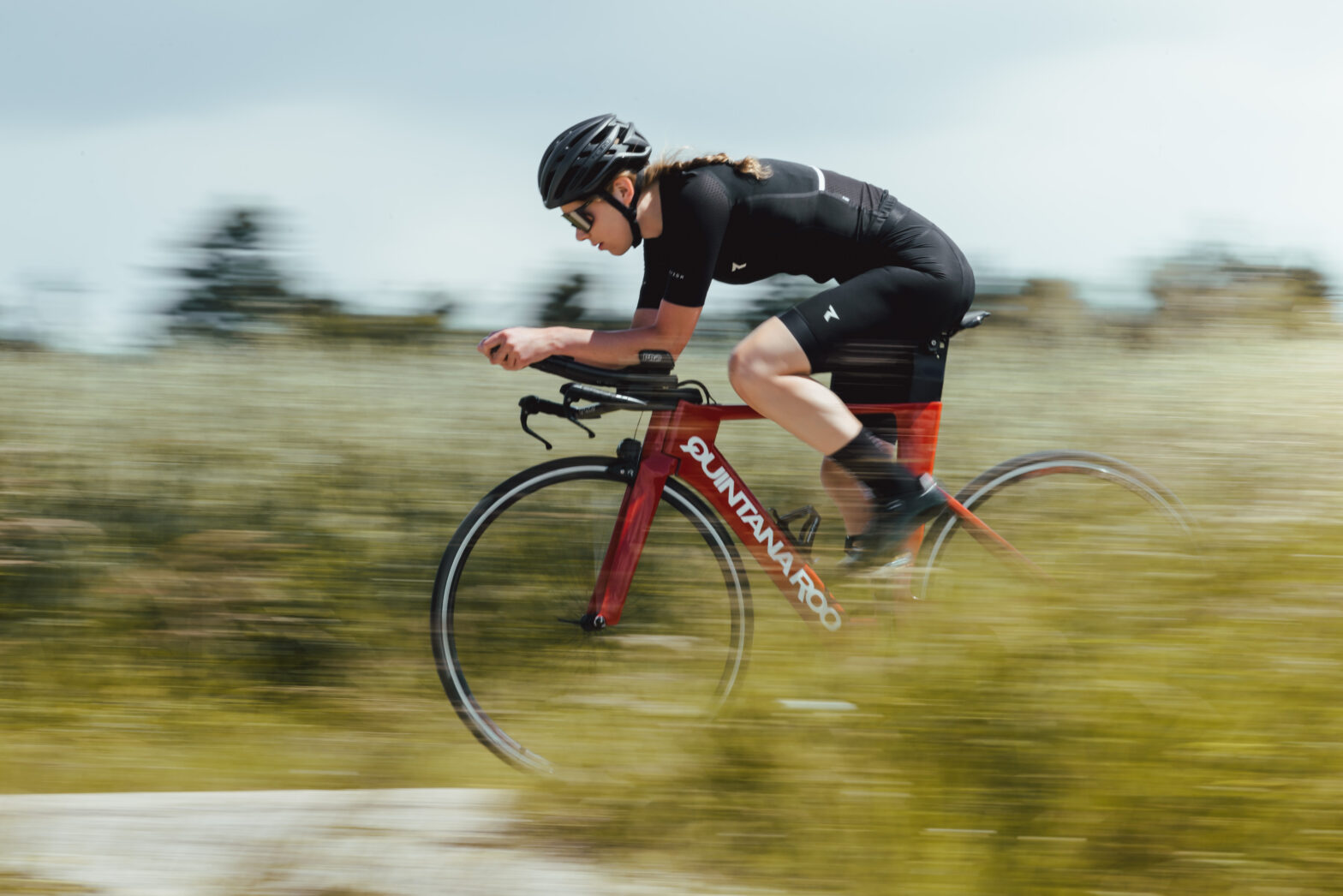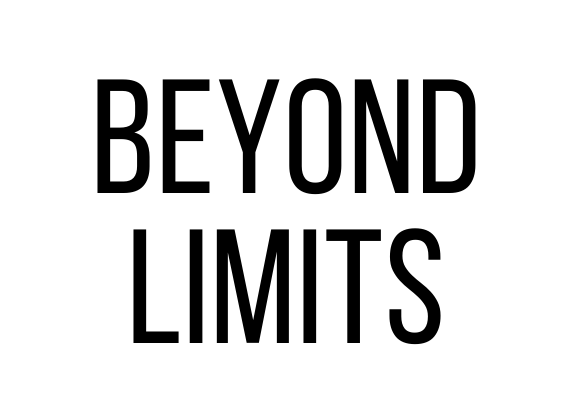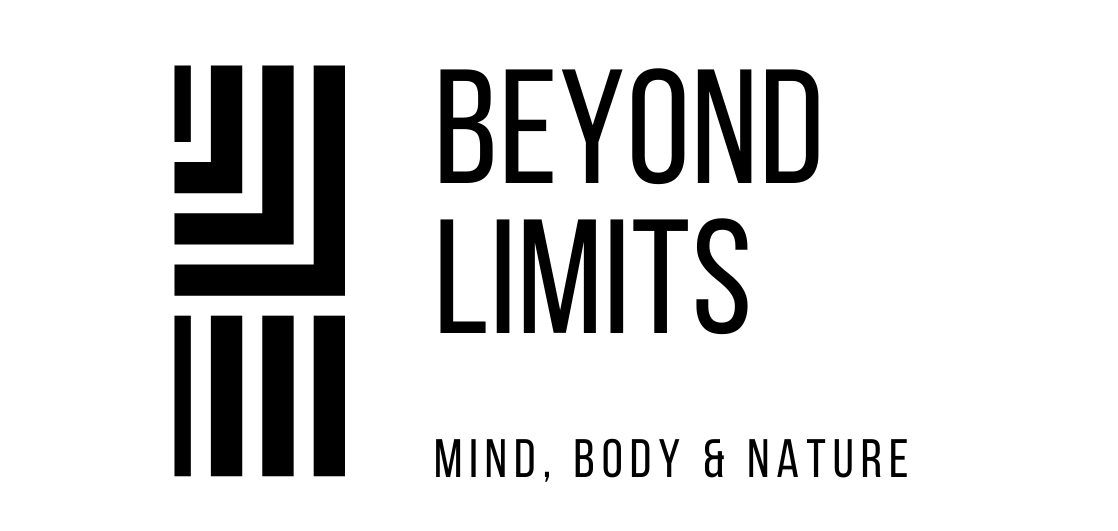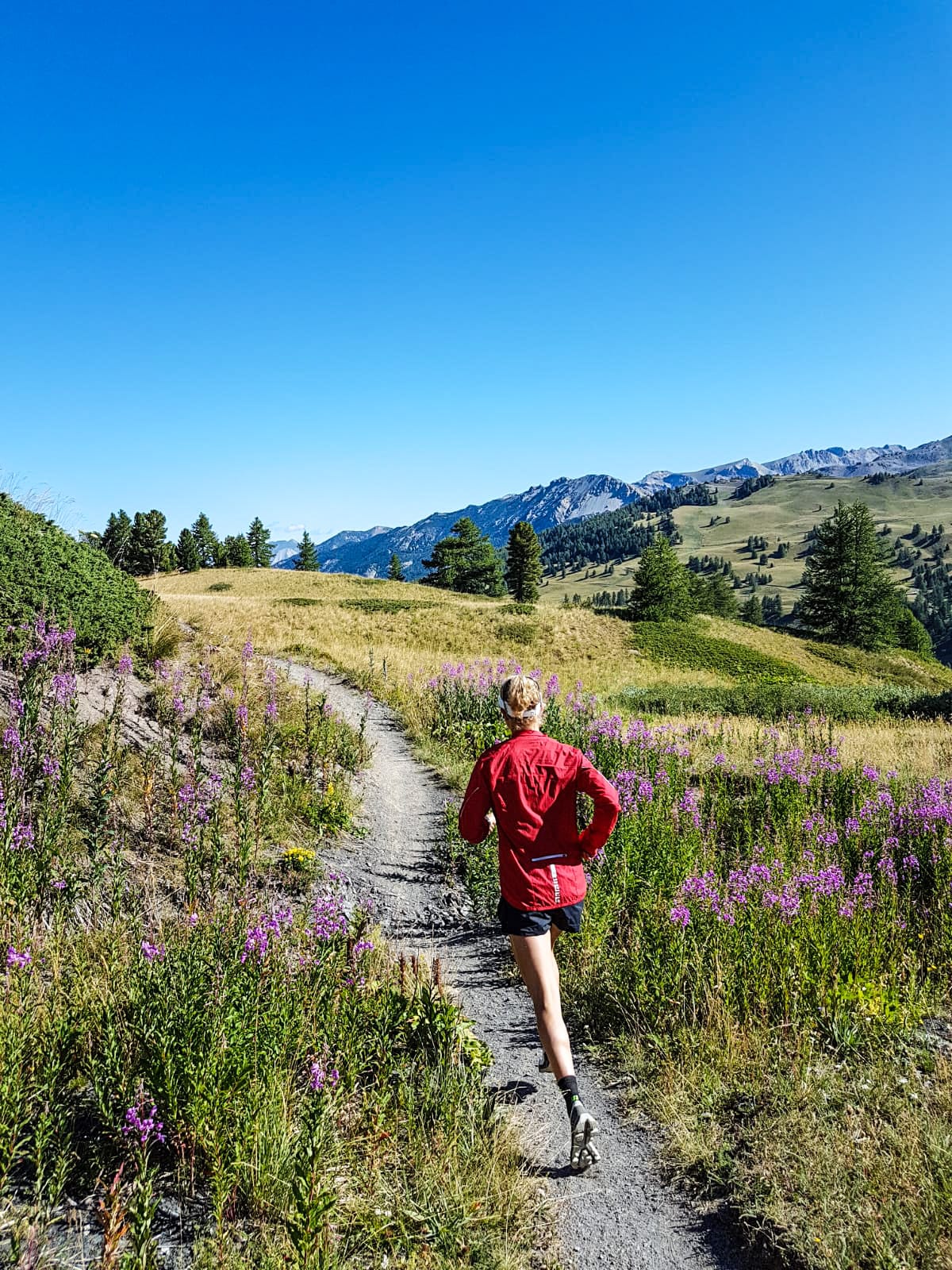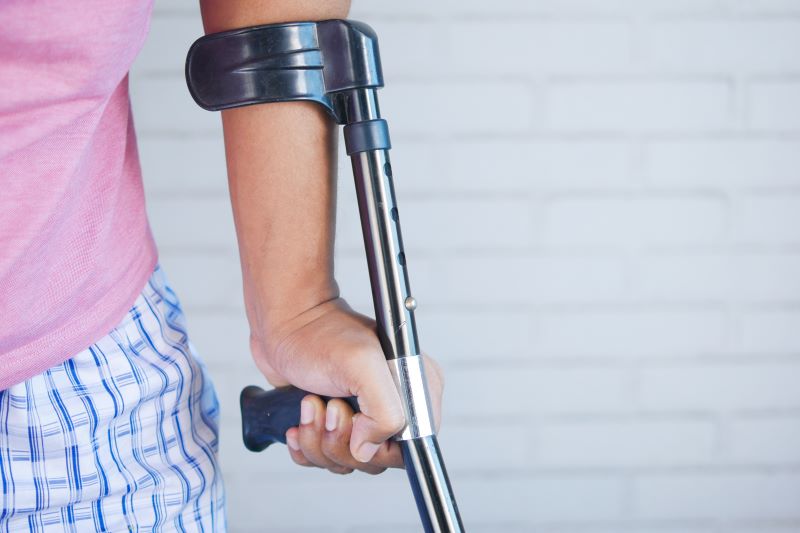Race Without a Winner: Navigating (Mental) Health Through the Pandemic
- Home
- Blog
Click here to read in German/Hier geht es zur deutschen Version
“In my head I worked out all the obstacles I’d been through and put them in a figurative cookie jar. And in hard times, I reach in and pull out perspective and resilience,” said Olympic track cyclist Holly Edmondston. “And yeah, I have a lot of cookies.”
The COVID-19 pandemic contributed to her cookie jar in many ways: lockdown, canceled races, and personal health problems. Being from New Zealand, Edmondston was confronted with two options: leaving her country to race overseas or staying in the “promised land of no covid”. Since March 2020, New Zealand’s borders have been closed, keeping covid out but the people in.
“I didn’t ride a race in the two years before the Olympic Games,” Edmondston said. Because most competitions were canceled or rescheduled, New Zealand’s riders received the same pay as the year before. “Financially it didn’t hinder us at all, because we weren’t going anywhere.”
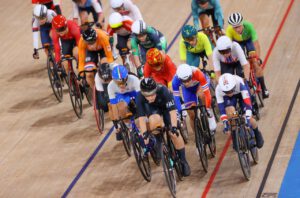
For Franziska Reng, runner-turned-triathlete from Germany, the COVID-19 pandemic hit right during her transition between the two sports. After two years of battling sickness, she had to quit professional running and picked up triathlon–just to see one competition after another being canceled.
“I would say it was another small setback, but in retrospect it wasn’t only bad for me,” Reng said, who represented Germany as a junior cross country and track runner. Even after she quit running, the financial reserves she had built from sponsorship contracts and German sports aid carried her through 2020.
The pandemic also gave her time to set a new course in her career. In her job as a freelance journalist and author, she has enough freedom to balance triathlon training, racing, and working on passion projects such as her print magazine “Podium”.
“A lot has changed in my life over the last three years,” Reng said. “It’s not like I was doing bad before and now I’m doing better. My everyday life is just different now and I think different thoughts. It’s good to see that change is just part of life.”
When Reng was diagnosed with a complicated gastrointestinal disorder in 2018, her life changed drastically. She had recently become the German half marathon champion and was preparing for the European Championships when she started suffering stomach pains and nausea. One night she woke up with extreme pain and called her dad, a gastroenterologist, to run a few tests on her. The results showed severe bowel obstruction caused by intestinal malrotation.
“It would have been reckless to continue professional running with a diagnosis like that,” Reng said. She tried to keep going for a bit, but quickly reached her limits as she noticed that her body didn’t recover as it used to. “In 2019, I found myself in a sort of personal crisis that didn’t only involve physical problems, but also affected my mental health.”
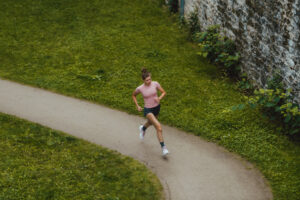
While Reng had people around her who supported her throughout those times, Edmondston was left to her own devices when she injured her back in August 2017.
“I had to pull out of all these competitions and I got kind of phased from the team,” she said. The team culture was less supportive and more competitive. If one rider was injured, it meant that the selection spots for competitions were given to fewer riders, which increases the likelihood of going to the Commonwealth Games or other international events.
It took half a year before Edmondston rode properly again. “It was super hard getting back on the bike,” she said.
A year later, her cycling career went over another road bump. When she started getting stomach pains and nausea, riding and racing became increasingly difficult. A few months later, she got diagnosed with endometriosis.
“I think it was the end of 2019 when I had laparoscopy to get rid of the endometriosis,” she said. “And I was like, crap, it’s only six months until the Olympic Games, it’s going to be a bit of a stretch to get recovered in time.”
Then COVID-19 hit and gifted her with one more year to recover. But even after her endometriosis surgery, she was still battling a lot of bloating and nausea.
“The selections for the Olympics weren’t good on my mental health,” she said. The coaches announced to each rider individually that another cyclist was selected to add more depth to the team. Even though she had earned her spot on the Olympic team, Edmondston was told that she wouldn’t be capable of competing in both the omnium and team pursuit because of her nausea struggles and her spot would be given to the 6th rider.
“I had been building towards these games since I was just a dreaming ten-year-old,” she said. Edmondston came to the conclusion that her nausea and fatigue had a reason beyond endometriosis: an anxiety disorder that had developed from the years of accumulated stress caused by her lifestyle and profession. “The closer to the Games I was getting, I was like, I don’t care. There was no joy, no anger, just kind of emptiness.”
When Edmondston received her anxiety disorder diagnosis in March 2021, her psychologist also recommended taking medication to increase her serotonin levels. A few weeks later, she felt the emotions coming back and her stomach issues receding.
Reng took a different way to improve her mental health. Right at the beginning of the pandemic, she packed her things and drove to her parent’s house at the Lake of Garda in Italy, where she spent almost one month to focus on her training.
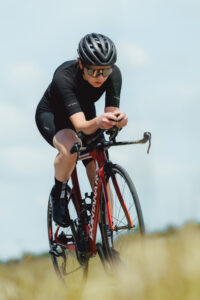
“I finally found some kind of peace and for the first time, I was able to switch off and distance myself from all the stress of the last year,” she said.
When some countries in Europe started closing their borders, Reng knew it was time to return home. Germany locked down over April and May, which meant a lot of staying home and social distancing.
“I wasn’t doing well because I was living on my own. I started doubting myself and what I was doing,” Reng said. Her work as a freelance writer had become “non-essential” in the pandemic. “I write about sports. But sports didn’t happen.”
There were no competitions to write about and no races to race. But when she met her new boyfriend in May, things started looking a bit brighter. “I suddenly had someone who gave me a lot of support. That’s when I decided to use the lockdown to collect miles and make progress in my triathlon journey.”
She realized that switching to triathlon was the right decision, even in the absence of competitions. After all, it’s important to like the day-to-day routine of training. “I don’t need races to validate my performance. I know that I’ll keep cycling, running, and swimming until I feel that I’m done.”
Reng’s source of motivation is her passion for the sport and doing what she loves. The struggles with her gastrointestinal disorder showed her that being happy with her own body is the most important thing.
Edmondston came to a similar conclusion after recovering from endometriosis and an anxiety disorder, while fighting for her spot on the Olympic team. She had to prove that she was physically strong and mentally capable to race in both the omnium and the team because her coaches didn’t believe she could do it. “And then on race day, it was perfectly clear that I was the right choice.”
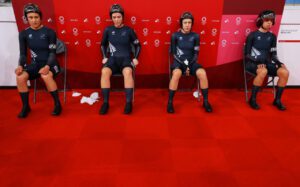
Edmondston placed tenth in the Omnium while her team placed eighth out of eight in the pursuit, still breaking their national record. To return to New Zealand, all Olympic athletes had to quarantine in MIQ (Managed Isolation Quarantine) for two weeks. On the plane back home, Edmondston and her team learned that a childhood friend and teammate had committed suicide after the Olympics.
“I haven’t been back to the velodrome and the training headquarters, and I haven’t seen anyone in person since the Games. I don’t have much direction and I didn’t really feel like getting on my bike again,” she said. On top of going through the trauma of losing a teammate, New Zealand’s riders got a pay cut of $1,000 a month after the Olympics, which means they are being paid below their nation’s minimum wage.
“All the drama in the past was completely avoidable. So much heartache was created from selections,” she said and suggests a selection panel of individuals from outside the sport to foster a fairer environment. She also speaks up about paying athletes a livable wage that allows them to focus on their full time job–representing their country.
Edmondston used the time after the Olympics to grieve and reflect. She hasn’t touched her road bike for 10 weeks and is more focused on having fun on the mountain bike instead. But her passion for cycling is still burning. Traveling is what she loves most about the sport, which fuels her commitment for another Olympic cycle until 2024. “I love representing my country,” Edmondston said.
Reng’s intestinal malrotation diagnosis forced her to give up her professional running career, but she’s looking forward to representing Germany at the 70.3 World Championships next year. For her, triathlon is all about collecting experiences, especially experiences in international competitions.
“I’m far away from making money with triathlon,” Reng said. But that gives her the chance to go at her own pace. “I’m excited to race overseas again. I definitely question the race-and-travel culture of jetting around the globe. But on the other hand, competing with people from all around the world is part of sports.”
Edmondston is now looking at the possibility of joining a road cycling team alongside her track team in 2022. “I’m not fit right now, but I’ll keep riding. Like I said and will keep saying, I believe everything happens for a reason.”
Thanks to Franzi and Holly for the interview and making this article possible!
Race without a Winner
„In meinem Kopf habe ich alle Hindernisse, die ich überwunden habe, aufgeschrieben und in eine Keksdose gelegt. Und in schwierigen Zeiten kann ich hineingreifen und Perspektive und Widerstandsfähigkeit herausziehen“, sagt die Profi-Bahnradfahrerin Holly Edmondston. „Und ja, ich habe eine Menge Kekse.“
Die COVID-19-Pandemie trug in vielerlei Hinsicht zu ihrer Keksdose bei: Lockdown, abgesagte Rennen und gesundheitliche Probleme. Als Neuseeländerin war Edmondston mit zwei Optionen konfrontiert: ihr Land zu verlassen, um im Ausland Rennen zu fahren, oder im „gelobten Land ohne Corona“ zu bleiben. Seit März 2020 sind die neuseeländischen Grenzen geschlossen, was es selbst für Einwohner schwierig macht, zurück in ihr Land einzureisen.
„In den zwei Jahren vor den Olympischen Spielen bin ich kein einziges Rennen gefahren“, sagt Edmondston. Da die meisten Wettkämpfe abgesagt oder verschoben wurden, erhielten die Radfahrer im neuseeländischen Nationalteam den gleichen Lohn wie im Jahr zuvor. „Finanziell hat uns die Pandemie nicht so stark getroffen, weil wir ja zu keinen Wettkämpfen fahren mussten.“

Für Franziska Reng, Ex-Läuferin und jetzt Triathletin aus Deutschland, kam die Pandemie genau in der Zeit, als sie die Sportart wechselte. Nachdem sie zwei Jahre lang mit einer Darmkrankheit zu kämpfen hatte, musste sie den Profi-Laufsport aufgeben und begann mit dem Triathlon – nur um dann eine Wettkampfabsage nach der anderen zu erleben.
„Ich würde sagen, das war ein weiterer kleiner Rückschlag, aber im Nachhinein war es nicht nur schlecht für mich“, sagte Reng, die als Läuferin international für Deutschland startete. Die finanziellen Reserven, die sie durch den Profi-Laufsport aufbauen konnte, trugen sie durch 2019 und 2020.
Die Pandemie gab ihr auch Zeit, um ihre Karriere neu auszurichten. In ihrem Job als freiberufliche Texterin und Autorin hat sie genug Freiraum, um Triathlon-Training, Wettkämpfe und Projekte wie ihrem Printmagazin „Podium“ unter einen Hut zu bringen.
„In den letzten drei Jahren hat sich in meinem Leben viel verändert“, sagt Reng. „Es ist nicht so, als wäre es mir vorher schlecht gegangen und jetzt geht es mir besser. Mein Alltag ist jetzt einfach anders und ich denke anders. Es ist gut zu sehen, dass Veränderungen einfach zum Leben dazugehören.“
Als bei Reng in 2018 eine komplizierte Magen-Darm-Erkrankung diagnostiziert wurde, änderte sich ihr Leben drastisch. Sie hatte gerade die deutschen Meisterschaften im Halbmarathon gewonnen und bereitete sich auf die Europameisterschaften vor, als sie starke Magenschmerzen und Übelkeit bekam. Eines Nachts wachte sie mit extremen Schmerzen auf und rief ihren Vater an, der ein Gastroenterologe ist, der ein paar Tests durchführte. Wenig später kam er mit der Diagnose „Darmverschluss“ zurück.
„Es wäre leichtsinnig gewesen, mit so einer Diagnose weiter Leistungssport zu machen”, sagt Reng. Nach ihrer Entlassung aus dem Krankenhaus versuchte sie für eine kurze Zeit, so weiter zu laufen, wie sie es gewohnt war. Sie stieß aber schnell an ihre Grenzen, als sie merkte, dass ihr Körper nicht mehr so schnell regeneriert wie früher. „In 2019 befand ich mich in einer Art Krise, wo es nicht nur um die Gesundheit ging, sondern auch um die Psyche.“

Während Reng Menschen um sich hatte, die sie in dieser Zeit unterstützten, war Edmondston auf sich allein gestellt, als sie sich im August 2017 am Rücken verletzte.
„Ich musste viele Wettkämpfe absagen und wurde sozusagen kurzzeitig aus meinem Team ausgeschlossen“, sagte sie. Ihr Team weniger auf Unterstützung ausgerichtet und mehr auf Konkurrenz. Wenn eine Radfahrerin verletzt war, bedeutete dies, dass die Startplätze für Wettkämpfe an weniger Radfahrer vergeben werden, was die Wahrscheinlichkeit erhöht, an den Commonwealth Games oder anderen internationalen Veranstaltungen teilzunehmen.
Es dauerte ein halbes Jahr, bis Edmondston wieder richtig ins Training zurückkehren konnte. „Es war sehr schwer, wieder auf dem Sattel zu sitzen“, sagt sie.
Ein Jahr später erlebte ihre Radsportkarriere einen weiteren Rückschlag. Als sie anfing, mit Magenschmerzen und Übelkeit zu kämpfen, wurden das Training und Wettkämpfe immer schwieriger. Nach ein paar Monaten wurde bei ihr Endometriose diagnostiziert.
„Es war Ende 2019, als ich eine Laparoskopie hatte, um die Endometriose loszuwerden“, sagt sie. „Und ich dachte mir: Mist, es sind nur noch sechs Monate bis zu den Olympischen Spielen, es wird ein eng, rechtzeitig wieder gesund zu werden.“
Dann kam die Corona-Pandemie und gab ihr ein weiteres Jahr zur Genesung. Aber auch nach ihrer Endometriose-Operation hatte sie immer noch mit Blähungen und Übelkeit zu kämpfen.
„Die Auswahl für die Olympischen Spiele war nicht gut für meine mentale Gesundheit“, sagt sie. Die Trainer teilten jedem Sportler mit, dass ein weiterer Radfahrer ausgewählt wurde, um das Team zu verstärken. Obwohl sie sich ihren Platz in der Olympiamannschaft verdient hatte, wurde Edmondston gesagt, dass sie wegen ihrer Magenprobleme nicht in der Lage sei, sowohl am Omnium als auch an der Mannschaftsverfolgung teilzunehmen – ihr Platz würde an die sechste Fahrerin vergeben.
„Ich hatte auf diese Spiele hingearbeitet, seit ich nur ein träumendes zehnjähriges Mädchen war“, sagt sie. Nach weiterer Recherche kam Edmondston zu dem Schluss, dass ihre Übelkeit und Müdigkeit einen anderen Grund als die Endometriose hatten. „Je näher ich den Spielen kam, desto mehr waren sie mir egal. Da war keine Freude, keine Wut, nur eine Art Leere.“
Im März 2021 erhielt Edmondston die Diagnose „Angststörung“, die sich aus dem jahrelangen Stress durch ihren Beruf als Profisportlerin entwickelt hatte. Ihre Psychologin empfahl auch die Einnahme von Medikamenten, um ihren Serotoninspiegel zu erhöhen. Einige Wochen später spürte sie, wie die Emotionen zurückkamen und ihre Magenprobleme sich zurückgingen.
Reng wählte einen anderen Weg, um ihre mentale Gesundheit zu verbessern. Zu Beginn der Pandemie packte sie ihre Sachen und fuhr in das Haus ihrer Eltern am Gardasee in Italien, wo sie fast einen Monat verbrachte, um sich auf ihr Training zu konzentrieren.

„Ich kam dort endlich zur Ruhe und konnte zum ersten Mal abschalten und mich von dem ganzen Stress des letzten Jahres distanzieren“, sagt sie.
Als einige Länder in Europa begannen, ihre Grenzen zu schließen, wusste Reng, dass es Zeit war, nach Hause zurückzukehren. Deutschland schloss im April und Mai seine Grenzen, was bedeutete, dass sie viel zu Hause blieb und „Abstand hielt“.
„Da ging es mir richtig schlecht, weil ich alleine lebte. Ich begann an mir selbst zu zweifeln und an dem, was ich mache“, sagte Reng. Ihre Arbeit als freiberufliche Texterin war in der Pandemie nicht systemrelevant. „Ich schreibe über Sport. Aber Sport hat nicht stattgefunden.“
Es gab keine Wettkämpfe, über die man schreiben konnte, und keine Rennen, die man selbst machen konnte. Doch als sie im Mai ihren neuen Freund kennenlernte, begannen die Dinge etwas besser auszusehen. „Ab dem Moment war das für mich erträglich. Und da habe ich dann versucht, das Beste draus zu machen, den Lockdown dafür zu nutzen, Trainingsstunden, Trainings, Kilometer zu sammeln und mich weiterzuentwickeln.“
Sie erkannte, dass der Wechsel zum Triathlon die richtige Entscheidung war, auch wenn es keine Wettkämpfe gab. Schließlich ist es wichtig, die tägliche Trainingsroutine zu mögen. „Ich brauche keine Wettkämpfe, die mir meine Leistung bestätigen. Ich weiß, dass ich so lange Rad fahren, laufen und schwimmen werde, bis keinen Bock mehr habe.“
Rengs Motivationsquelle ist ihre Leidenschaft für den Sport und das zu tun, was sie liebt. Durch ihre Darmerkrankung hat sie außerdem gelernt, dass es ihr wichtig ist, mit ihrem eigenen Körper zufrieden zu sein. „Das war lange nicht der Fall. Für mich geht es einfach um eine innere Zufriedenheit und die bekomme ich durch den Sport.“
Edmondston kam zu einem ähnlichen Schluss, nachdem sie sich von ihrer Endometriose und der Angststörung erholt hatte. Als sie um ihren Platz in der Olympiamannschaft kämpfte, musste sie beweisen, dass sie körperlich stark genug und psychisch in der Lage ist, beide Wettkämpfe zu fahren, weil ihre Trainer ihr das nicht zugetraut hatten. „Und am Tag des Rennens war dann klar, dass ich die richtige Wahl war.“

Edmondston belegte im Omnium den zehnten Platz, während ihr Team in der Verfolgung den achten Platz belegte und damit einen neuen Landesrekord aufstellte. Um nach Neuseeland zurückzukehren, mussten alle Olympia-Rückkehrer zwei Wochen lang in MIQ (Managed Isolation Quarantine) in Quarantäne gehen. Auf dem Rückflug erfuhren Edmondston und ihr Team, dass eine Freundin und Teamkollegin nach den Olympischen Spielen Selbstmord begangen hatte.
„Ich war seitdem nicht mehr im Velodrom und im Trainingszentrum und habe seit den Spielen niemanden aus dem Team mehr persönlich gesehen. Mir fehlt momentan die Orientierung und ich habe eine Auszeit gebraucht“, sagte sie. Neben dem Tod einer Teamkollegin wurden dem neuseeländischen Nationalteam nach den Olympischen Spielen die Gehälter um 1.000 Dollar pro Monat gekürzt, was weniger als der Mindestlohn ist.
„Das ganze Drama war völlig vermeidbar. Die Auswahl der Athleten hat so viel Drama versuracht, das völlig vermeidbar war“, sagt sie und schlägt vor, ein Auswahlgremium mit Personen außerhalb des Sports einzusetzen, um ein faireres Umfeld zu schaffen. Die Athleten sollten außerdem ein angemessenes Gehalt erhalten, damit sie sich auf ihre eigentliche Aufgabe konzentrieren können: ihr Land zu vertreten.
Für Edmondston war die Zeit nach den Olympischen Spielen geprägt von Trauer und Reflektion. Sie hat ihr Rennrad seit zehn Wochen nicht mehr angerührt und hält sich stattdessen mit Mountainbiken fit. Aber ihre Leidenschaft für den Radsport ist trotzdem ungebrochen. Das Reisen ist das, was sie am meisten an ihrem Sport liebt, und damit ihre Motivation für weitere drei Jahre bis Paris 2024. „Ich liebe es, mein Land zu vertreten“, sagte Edmondston.
Rengs musste ihre Profi-Laufkarriere wegen ihrer Darmerkrankung aufgeben, aber sie freut sich darauf, Deutschland nächstes Jahr bei den 70.3-Weltmeisterschaften zu vertreten. Für sie geht es beim Triathlon vor allem darum, Erfahrungen zu sammeln – vor allem Erfahrungen bei internationalen Wettkämpfen.
„Ich bin weit davon entfernt, mit Triathlon Geld zu verdienen“, sagt Reng. Aber das gibt ihr die Möglichkeit, ihr eigenes Tempo zu gehen. „Ich freue mich darauf, wieder bei Wettkämpfen im Ausland zu starten. Ich stelle definitiv diesen Wettkampftourismus in Frage und um den Globus zu jetten. Aber auf der anderen Seite gehört es zum Sport, sich mit Menschen aus aller Welt zu messen.“
Edmondston überlegt sich, in 2022 neben ihrem Bahnteam auch für ein Straßenradteam zu starten. „Ich bin im Moment nicht fit, aber ich werde weiter Rad fahren. Wie ich schon sagte und immer wieder sagen werde, ich denke, dass alles aus einem bestimmten Grund geschieht.“
Vielen Dank an Franzi und Holly für das Interview!
Post Tags
About The Author
I did my first triathlon on a pink kid’s bike with training wheels at six years old. That’s where my love for the sport was born, but it took another decade until I figured out that I wanted to combine my passions for sports and writing.
Disclaimer
All resources and information shared on this website are only for informational purposes and aren’t intended to diagnose, treat, or cure any condition or disease.

